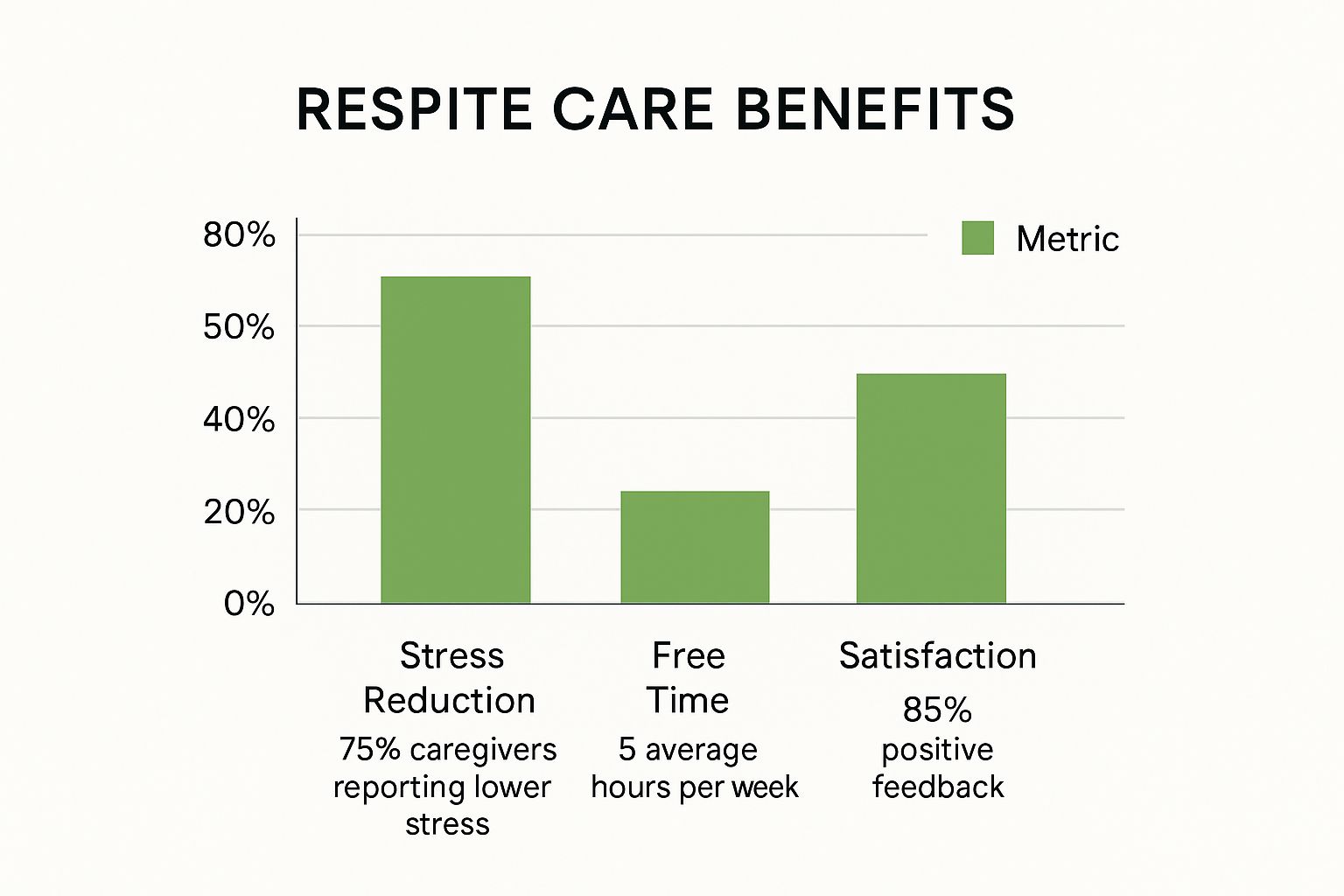At its heart, respite care is simply a planned, temporary break for family members who care for an elderly loved one. It brings in professional support, giving the primary carer a chance to step back, rest, and recharge. It’s an absolutely essential service designed to prevent the all-too-common issue of carer burnout, safeguarding the wellbeing of everyone involved.
Why Respite Care Is a Lifeline for Families

Being a full-time carer is one of the most rewarding things you can do, but it's also incredibly demanding. The long hours, the emotional toll, and the personal sacrifices can really add up. Think of it like running a marathon; you can't just keep going without a single break for water. Sooner or later, you'll hit a wall. Respite care for elderly relatives provides those crucial water stops.
It’s not about giving up or admitting defeat; it's a proactive strategy for keeping everything in balance. It lets family carers step away for a bit, knowing with complete confidence that their loved one is in safe, professional hands. This isn't a luxury—it's a vital part of any sustainable, long-term care plan.
Preventing Carer Burnout
Carer burnout is a very real state of physical, emotional, and mental exhaustion. It often shows up as persistent fatigue, high stress levels, anxiety, and can even lead to depression. Respite care is a direct solution, offering relief before that stress becomes overwhelming.
Taking that time for yourself brings a whole host of benefits:
- Rest and Recovery: It’s a chance to catch up on sleep, relax properly, and physically recover from the constant demands of caregiving.
- Personal Time: You can finally get to your own appointments, see friends, or enjoy a hobby—all the things that help you feel like yourself.
- Reduced Stress: Just knowing a professional is there offers incredible peace of mind and can significantly lower your anxiety levels.
By taking care of your own wellbeing, you're actually ensuring you can provide the best possible support for your loved one in the long run. It helps strengthen your relationship and makes the entire care journey a more positive experience for everyone.
A Growing Need Across the UK
The need for services like this is becoming more critical as the UK population continues to age. This major demographic shift means more and more families are finding themselves in a caring role. In fact, it's projected that by 2030, over 15.5 million people in the UK will be aged 65 or over.
This naturally increases the demand for robust support systems like respite care, particularly as age-related health conditions become more common. You can explore more about the impact of these demographic changes on the home care industry.
What Kinds of Respite Care Can I Get?
Respite care isn’t a one-size-fits-all solution. Think of it more like a toolkit, filled with different options designed to fit the unique puzzle of each family's needs here in the UK. Sometimes you just need a small, specific tool for a few hours; other times, you might need a more comprehensive solution for a longer break. Getting to know what's out there is the first step to finding the right fit for your loved one and, just as importantly, for you.
For many, the best place to start is at home. The most common type of respite care for elderly people is delivered right in their own living room, which is often the most comfortable and least disruptive choice. It means your loved one can stay in a familiar, comforting space, surrounded by their own things and memories.
In-Home Respite Care
The beauty of in-home care is its flexibility. A professional carer can pop in for just a few hours a week, giving you the breathing room to run errands, get to a doctor's appointment, or simply catch up with a friend over a coffee. This support can be as simple as providing a bit of company and helping with household chores, or it can involve more hands-on assistance. It's helpful to understand the difference between personal care vs home help to see the full range of what a carer can do.
If you’re planning a longer break, like a much-needed holiday, you can arrange for a live-in carer. This provides continuous, round-the-clock support, giving you total peace of mind that your loved one is safe and well looked after while you're away. It’s a fantastic way to ensure their daily routines are kept just as they like them.
Getting Out and About: Residential and Day Care Centres
Sometimes, a change of scenery does everyone a world of good. Residential respite care offers a short stay in a dedicated care home, providing a safe, structured, and social environment.
A short stay in a residential home can be a refreshing experience for your loved one. It’s a chance to meet new people and take part in different organised activities. It can also be a helpful 'test run' if you're considering a care home as a longer-term option down the road.
This is a powerful option, and the benefits are clear. Families consistently report huge improvements in their well-being after using respite services.

The numbers speak for themselves. Respite care makes a real difference, with 75% of caregivers reporting lower stress levels and a staggering 85% expressing satisfaction with the support they received.
Another brilliant choice is an adult day care centre. These centres are hubs of activity, offering a great mix of professional care and social fun during the day.
- Structured Activities: They run a timetable of activities, from arts and crafts to gentle exercise, keeping everyone mentally and physically engaged.
- Social Interaction: Day centres are fantastic for tackling loneliness, helping people build friendships with others in a warm, supportive setting.
- Regular Breaks: For you, the carer, day centres offer a predictable schedule, meaning you can plan your week knowing you have that time free.
To help you weigh up the choices, here's a quick comparison of the main types of respite care.
Comparing Respite Care Options
| Type of Care | Best For | Typical Duration | Key Benefit |
|---|---|---|---|
| In-Home Care | Maintaining familiar routines and comfort at home. | A few hours to 24/7 live-in support. | Highly flexible and minimally disruptive for the individual. |
| Residential Care | A change of scenery, social interaction, and 24/7 medical support. | A few days to several weeks. | Offers a safe, structured environment and social opportunities. |
| Day Care Centre | Regular, scheduled breaks for carers and social engagement for loved ones. | Daytime hours, from one to five days a week. | Combats loneliness and provides a predictable routine. |
| Emergency Care | Unplanned situations requiring immediate, short-term support. | As needed, usually for a few days. | Provides a crucial safety net during a crisis. |
Thinking through these options can help you pinpoint exactly what kind of support would make the biggest difference for your family right now.
Planning for the Unexpected
Life has a habit of throwing curveballs. A sudden illness, a family crisis, or another emergency can mean you need help at a moment's notice. That’s exactly what emergency respite care is for.
Many care homes and home care agencies keep a few spots or staff members on standby for these urgent situations. While your choices might be more limited than with planned respite, immediate help is often available. It’s a really smart idea to research local providers who offer emergency services before you need them. That way, if a crisis does happen, you already know who to call, which can make a very stressful situation feel much more manageable.
Benefits for Both Carers and Elderly Individuals

It’s easy to think of respite care as being just for the person receiving it, but the reality is far more profound. It creates a positive ripple effect, supporting everyone involved. This isn't just about providing a substitute carer; it's about nurturing relationships and restoring a healthy balance for the long haul.
For a family carer, arranging respite is like finally being able to take a deep, restorative breath. It’s a planned, guilt-free opportunity to step back and reclaim your own time.
This break means you can finally get to your own appointments, catch up with friends, or just enjoy a quiet afternoon without being on high alert. Think of a son who cares for his mum finally taking a week’s holiday, truly able to relax because he knows she's safe, happy, and in expert hands. It’s more than just a holiday; it’s a complete mental and emotional reset.
A Fresh Perspective for Carers
Stepping away from the role of a full-time carer offers more than just rest—it provides perspective. When you’re caught up in the daily routine, it's easy to become overwhelmed. Respite gives you the space to see the bigger picture, helping you return to your role with renewed patience and energy.
The benefits for carers are tangible and directly tackle the risk of burnout:
- Reduced Stress and Anxiety: Handing over the reins to a trusted professional lets you properly switch off, which dramatically lowers stress levels.
- Improved Physical Health: You get the chance to focus on your own wellbeing, whether that's getting more sleep, exercising, or attending your own medical check-ups.
- Strengthened Relationships: A break allows you to reconnect with partners, children, and friends who may have unintentionally taken a backseat.
This is a key reason why respite care for elderly loved ones is so essential. By protecting the carer's wellbeing, the entire support system stays strong and sustainable. You can learn more about how respite care supports families and prevents burnout in our dedicated guide.
Enhancing Wellbeing for Elderly Individuals
For the person receiving care, the benefits are just as significant. Respite should never feel like being "sent away." Instead, it’s an opportunity for a positive, enriching experience—a welcome change of pace and scenery.
Respite care offers a unique chance for elderly individuals to socialise with new people, engage in different activities, and receive focused attention from professionals trained in their specific needs. This can boost their confidence and reduce feelings of isolation.
A short stay in a residential home or having a new face visit for in-home care can spark fresh conversations and even new friendships. This social and mental stimulation is vital for cognitive health and emotional wellbeing, helping to keep the mind sharp and spirits high.
Ultimately, this time apart can make the bond between a carer and their loved one even stronger. When you both return refreshed from your separate experiences, the time you spend together is focused more on connection and less on the practical strains of caregiving. It allows you to simply enjoy each other’s company again.
Navigating the Costs and Funding for Respite Care

Let's be honest, figuring out the financial side of respite care for elderly relatives can feel a bit like putting together a complicated puzzle. But once you know where to find the key pieces, a clear picture starts to emerge. Thankfully, here in the UK, there are established routes for getting support, and they almost always start with your local council.
The path to getting funding usually kicks off with two important evaluations: a Carer's Assessment for you, and a Needs Assessment for the person you're looking after. It's important to remember these aren't tests you can pass or fail. They’re simply structured conversations to get a handle on your situation and figure out what support would make a real difference.
Your Local Council: The Gateway to Support
Your first port of call should always be the adult social services department at your local council. You have a right to ask for a Carer's Assessment under the Care Act 2014, and it doesn't matter what your financial situation is or how many hours a week you care for someone. This assessment is all about the impact your caring role has on your own life and wellbeing.
At the same time, the person you look after is entitled to a Needs Assessment. This is where the council works out their specific care requirements and checks if they meet the national criteria for support. If both assessments point to respite care as a necessary part of the plan, the next step is to talk about funding.
Think of these assessments as creating an official map of your family's needs. This map allows the local authority to see exactly where support is required and helps them decide on the most appropriate and effective ways to provide it, including financial assistance.
A financial assessment, often called a means test, will almost certainly follow. This is how the council determines who pays for the care. They’ll look at your loved one’s income and savings to see if they should contribute. If their savings fall below a certain threshold (which differs across England, Scotland, Wales, and Northern Ireland), it's very likely the council will provide financial support.
Understanding Your Funding Options
If the council agrees to fund some or all of the respite care, they'll usually present a few ways to manage the money. Getting your head around these options is key, as it lets you choose the path that offers you the most control and flexibility.
The most common methods are:
- Direct Payments: The council gives the money straight to you, putting you in the driver's seat to organise and pay for respite care yourself. This offers maximum flexibility, letting you pick a provider that’s the perfect fit for your family.
- Council-Arranged Care: The council takes care of all the arrangements for you, choosing from their list of approved providers. This can be a much simpler, hands-off option if you'd rather not manage the logistics.
- A Mix of Both: Some councils offer a hybrid approach, where they might arrange certain services but give you a direct payment to sort out others.
Don't stop at the council, though. It’s always worth looking into other avenues. Many charities and benevolent funds offer grants specifically for carers who need a break. Organisations like Turn2us have excellent grant search tools that can help you find pots of money you might be eligible for.
The scale of care in the UK is vast. There are approximately 16,566 care homes for adults, with local authorities helping to fund the stays of around 226,319 residents nationwide. This really underlines how council funding is a cornerstone of the system for so many families. You can explore more UK care home statistics to get a better sense of the landscape.
Your Guide to Arranging Respite Care, Step by Step
Thinking about arranging respite care can feel a bit overwhelming at first, but it doesn't have to be. By breaking it down into a few clear steps, you can navigate the process with confidence and find the right support for both you and your loved one. Think of it as a roadmap, guiding you from those first conversations right through to the first day of care.
The best place to start isn't with a Google search, but with a good, honest chat at home. Getting everyone on the same page from the beginning makes everything that follows so much easier.
Step 1: Start with a Family Conversation
Before you even think about looking up providers, it’s vital to sit down with your family. This is about more than just logistics; it’s a chance to talk about feelings, worries, and what everyone hopes to get out of this. When you approach it as a team, the entire experience feels more supportive.
To get the ball rolling, try asking a few key questions:
- How long of a break are we talking about? Is it a few hours a week to get the shopping done, or a proper two-week holiday to fully switch off and recharge?
- What kind of care would feel right? Would your loved one prefer staying in the comfort of their own home, or would the company and change of scene at a residential home be a welcome change?
- What are the absolute must-haves? Think about specific medication times, dietary needs, or cherished daily routines that need to be kept just so.
Having this conversation early on creates a shared understanding of what’s needed. It turns what could be a stressful task into a collaborative effort to do what’s best for everyone.
Step 2: Do Your Homework on Local Providers
With a clear picture of your family’s needs, you can start looking for local providers who tick all the boxes. Your aim here is to build a shortlist of reputable options.
A brilliant and essential resource in England is the Care Quality Commission (CQC). As the independent regulator for all health and social care, their website is a goldmine of information. You can find detailed inspection reports and official ratings for every registered care home and home care agency. Checking a provider’s CQC rating is a non-negotiable step.
As you do your research, keep a running list of providers that look promising. Dive into their websites and get a feel for their approach. Do they clearly explain their services? Do they talk about their staff's training and qualifications? This initial digging will help you narrow the field before you start making calls.
Step 3: Visit and Ask the Right Questions
A website can tell you a lot, but nothing beats seeing a place for yourself or having a proper chat with the person in charge. If you’re considering a residential home, book a tour. For care at home, arrange for a manager to visit you. This is your chance to get a genuine feel for the atmosphere and the people who would be looking after your family member.
Go prepared with a list of questions. It helps you compare apples with apples and ensures you don’t forget anything important in the moment.
Here are a few crucial things to ask:
- What specific training do your carers have, particularly for conditions like dementia or for helping with mobility?
- How do you develop a personal care plan, and how often do you review it? You can learn more about how home care services are set up in 5 simple steps.
- What does a typical day look like for someone receiving respite care with you?
- How will you keep in touch with us while we’re away?
- What’s your procedure if there’s a medical emergency?
Step 4: Book the Care and Prepare Your Loved One
Once you’ve done your research and your visits, one provider will likely stand out as the best fit. Now it’s time to make it official by booking the service, and then gently preparing your loved one for the change. Try to book well in advance, as good providers get snapped up quickly, especially around holiday times.
How you prepare your loved one can make all the difference. Talk about the plan in a positive, reassuring way. Focus on the good things for them—perhaps a change of scenery or the chance to chat with new people. It’s also helpful to frame your break not as you leaving, but as an opportunity for you to rest so you can come back refreshed and be an even better carer.
How to Choose a High-Quality Respite Provider
Choosing the right respite care for someone you love is a big decision. It’s a real blend of ticking the practical boxes and trusting your own intuition. To feel truly confident in your choice, you have to look past the brochures and get a genuine sense of the care being offered. It's about finding a service that feels right, not just one that looks good on paper.
Your first port of call should always be the official regulatory bodies. For any service in England, that means checking their latest Care Quality Commission (CQC) report. The CQC is the independent regulator, and their ratings—from 'Outstanding' to 'Inadequate'—give you a vital, unbiased look at how safe, effective, and well-led a provider is. Consider this a non-negotiable first step.
Looking Beyond the Official Ratings
While a good CQC rating is the baseline, the real test comes when you visit. This is your chance to observe the little things that tell the true story. How do the staff speak to the people they're looking after? You're looking for warmth, respect, and genuine connection in those small interactions.
A positive, thriving care environment is often a bit noisy – full of chatter, laughter, and activity. A place that’s completely silent, or where carers seem disengaged, could be a red flag. Always trust your gut instinct; if a place just doesn't feel right, there’s probably a good reason. You want somewhere your loved one won't just be safe, but will feel happy and valued too.
Verifying Staff Expertise and Communication
It’s crucial to make sure the staff have the right skills, especially if your loved one has specific needs like dementia or requires mobility support. Never be afraid to ask direct questions about qualifications, experience, and what ongoing training the team receives. A great provider will be proud to tell you about their team's expertise. For instance, understanding how personalised home care supports independent living is central to finding a service that truly sees the person, not just the condition.
Clear and consistent communication is the bedrock of a good care partnership. Ask about their policies for keeping families updated. How will they contact you in an emergency, and how often can you expect routine updates?
Finally, see how the provider fosters family connections. We've all been reminded recently of how important visiting is, and official data shows that as of mid-2025, visitor accommodation in English care homes has steadied at around 99%. This reflects a welcome focus on maintaining those vital social bonds. You can learn more about these adult social care statistics. Picking a provider who champions these connections ensures your loved one remains a cherished part of the family, even when they're in respite care.
Got Questions About Respite Care? We've Got Answers
Deciding to look into respite care is a big step, but it often brings up a host of practical questions. How does it all work? What do I need to do first? Getting a handle on the details can make the whole process feel much less overwhelming.
Let's walk through some of the most common queries we hear from families, so you can move forward with confidence.
How Far in Advance Should I Book?
Honestly, the sooner, the better. If you’re planning a holiday or need a break during popular times like the summer holidays or Christmas, it’s wise to get things sorted well ahead of time.
Most care homes and agencies recommend booking at least four to six weeks in advance. This gives you the best chance of securing a spot with your first-choice provider on the dates you need. While you might find more last-minute flexibility with an in-home care service, planning ahead really does give you more options and peace of mind.
Of course, emergencies happen. It's often possible to arrange care at very short notice, but your choices will understandably be more limited.
Will the Local Council Help with the Costs?
It’s possible, yes. Your local council might contribute towards the cost of respite care, or in some cases, cover it entirely. But it all hinges on a couple of formal assessments.
The journey starts with a Carer’s Assessment for you, and a Needs Assessment for the person you look after. These are essentially conversations with social services to understand your situation and determine if respite care is a necessary support.
If the assessments show you're eligible, the council will then do a financial assessment (often called a means test) to work out how much, if anything, you'll need to contribute. The best first step is always to get in touch with your local authority’s adult social services department to get the ball rolling.
A needs assessment isn't a test you can pass or fail. Think of it as a structured chat to figure out what support would genuinely make a difference to both of you. It's the official starting point for getting any council-funded help.
What Should We Pack for a Short Stay in a Care Home?
When packing for a short respite stay, think comfort and familiarity. The goal is to make the experience as settled and stress-free as possible, and a few personal touches can make a world of difference.
Here’s a simple checklist to get you started:
- A good supply of comfortable, clearly labelled day clothes.
- Nightwear, a cosy dressing gown, and some well-fitting slippers.
- All essential toiletries, plus any personal aids like glasses or hearing aids (and don't forget spare batteries!).
- A few personal items to make their room feel more like home – perhaps some family photos, their favourite blanket, or a couple of good books.
At Cream Home Care, we know just how important it is to find support you can trust. Our compassionate respite care services in Stoke-on-Trent and Newcastle-under-Lyme are here to give you that much-needed break, knowing your loved one is in safe, caring hands. Visit us online to learn more about our personalised care plans.





